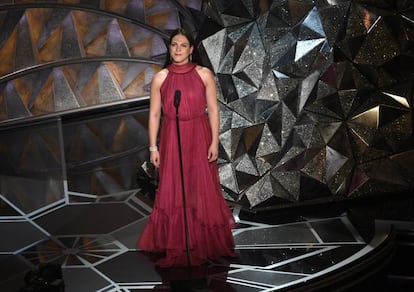Daniela Vega, the Chilean transgender actress who has made Oscar history
The star of “A Fantastic Woman,” which won Best Foreign Language Film at last night’s Academy Awards, spoke to EL PAÍS in February ahead of the Goyas

The star of Oscar-nominated film Una Mujer Fantástica (A Fantastic Woman), Daniela Vega, made Academy Award history last night, when she became the first transgender actress to take to the stage as a presenter at the ceremony. The Chilean introduced Sufjan Steven’s performance of “Mystery of Love,” which features on the soundtrack of Call Me by Your Name. “I want to invite you to open your hearts and your feelings to feel the reality,” she told the audience. “To feel love. Can you feel it?”
Vega was the first transgender woman to appear on the cover of magazines in Chile
The triumphant moment could not have been further from how things were when, as a 14-year-old, her life split in two, and she began her transition from a man to a woman. Once in her new female body, Vega did not know what path to follow – acting or singing – nor whether the artistic world would accept her.
“You learn and grow from pain,” she told EL PAÍS in February, hours before A Fantastic Woman took the Best Film award at the Goyas, Spain’s answer to the Oscars. “Transgender people are marginalized. You suffer a lot in the transition. And this pain makes us strong, hard, and can even make us bad tempered,” she explained, while Juan de Dio Larraín, the co-producer of the film, brought her a beer. With the support of her family, Daniela broke with social convention and assumed her identity as a trans-woman. “I have a lot of hope in the future generations in Chile, [society] is opening a great deal,” she said.

Before taking on the role of Marina in A Fantastic Woman, the actress worked as a hairdresser in a beauty salon. Through luck, destiny or coincidence, the director met Vega as he was researching the transgender world of Chile’s capital, Santiago de Chile. At first, she was going to work as a consultant but she ended up being the star of the movie, which delves into pain, loss and fear of the unknown.
Arts in Chile
Vega was only one year old when the Chilean dictator Augusto Pinochet left power in 1990. It was a country that lived in fear. The memory of torture camps, the tragic death of folk singer Víctor Jara, the military men and the guanacos (buses that sprayed dirty water on street protesters) were all still fresh in everyone’s mind.
Gay and trans people belonged to the underground. Their lives were known through the books of Pedro Lemebel, a writer who masterfully told the stories of people who were marginalized, as he was. Chilean society was deeply divided between those who broke the rules, such as Nicanor Parra, a self-described “anti-poet,” and the psychedelic filmmaker Alejandro Jodorowsky, and conservatives who praised respect, fear of the law, authority and the establishment.
A Fantastic Woman was warmly received when it debuted in Chile a year ago. Vega appeared on the country’s main television shows, staring fixedly into the camera with a simple message: “Love yourself, care for yourself, respect yourself in the most dignified way. All our bodies transition, I made a gender transition, others do it through age.” The actress, who began her artistic career as a singer, was the first transgender woman to appear on the cover of magazines in Chile, making her a cultural icon.
I want to invite you to open your heart and your feelings to feel the reality. To feel love. Can you feel it? Daniela Vega
Vega is writing a book for the publisher Planeta and is also preparing for two new roles, one for the cinema and the other for a theater in Santiago, which she has no intention of leaving.
In Hollywood, she has managed to win over a group of film lovers – something neither director Sebastián Lelio or the producers expected. “There has been a sort of virtuous spiral in the appreciation of the film, of the themes it talks about, in the historic, social, cultural moment we are living. The Pandora’s Box on women’s issues has been opened and with it there has been an explosion of trans themes. All this happened while we were writing the film. And while we were making it, the world did a 180 with Brexit and Trump,” explained Lelio.
It’s clear the director and the actress have a good relationship. They exchange knowing glances. Lelio sees Vega as a character from another time, she “is like a modern star and at the same time a diva from the 1940s. I have watched with great admiration how she has taken on all this responsibility. She has done it with a lot of grace.”
Lelio accredits poetry to the success of his film. “Poetry was my door into this world. For all Chilean teenagers, it’s like kissing for the first time, sleeping with someone for the first time – writing poetry is part of the ritual of being Chilean,” he said. He made his debut in the lyric arts reading Vicente Huidobro, and verse is the inspiration and basis of his films.
English version by Melissa Kitson.
Tu suscripción se está usando en otro dispositivo
¿Quieres añadir otro usuario a tu suscripción?
Si continúas leyendo en este dispositivo, no se podrá leer en el otro.
FlechaTu suscripción se está usando en otro dispositivo y solo puedes acceder a EL PAÍS desde un dispositivo a la vez.
Si quieres compartir tu cuenta, cambia tu suscripción a la modalidad Premium, así podrás añadir otro usuario. Cada uno accederá con su propia cuenta de email, lo que os permitirá personalizar vuestra experiencia en EL PAÍS.
¿Tienes una suscripción de empresa? Accede aquí para contratar más cuentas.
En el caso de no saber quién está usando tu cuenta, te recomendamos cambiar tu contraseña aquí.
Si decides continuar compartiendo tu cuenta, este mensaje se mostrará en tu dispositivo y en el de la otra persona que está usando tu cuenta de forma indefinida, afectando a tu experiencia de lectura. Puedes consultar aquí los términos y condiciones de la suscripción digital.








































